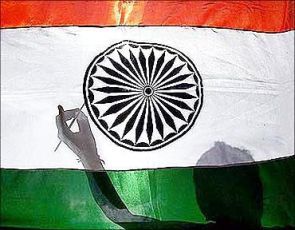A new West Asia is emerging and India must engage at the highest level and help shape this change, says Saeed Naqvi
 ‘Jup raha hai aaj maala ek Hindu ki Arab
‘Jup raha hai aaj maala ek Hindu ki Arab
Barhaman zaade mein shaan e dilbari aisi tau ho
Hikmat e Pandit Jawaharlal Nehru ki kasam
Mar mitey Islam jispey kafiri aisi to ho’
'Arabs are chanting the name of a Hindu,
Just look at the heart winning prince among Brahmins,
Behold the statesmanship of Pandit Jawahar Lal Nehru,
World of Islam lies at the feet of this non believer, free of sins.’
There is a great deal to despair about Nehru's legacy, but another occasion for that. Here, the poet is spot on, eulogising India’s first prime minister as he led the newly independent nation, charting a course that was more or less equidistant between the power blocs.
In effect New Delhi leaned more towards Moscow because it happened to be geographically nearer home. Also, in the early aftermath of decolonisation, socialism, not capitalism, was the fashionable creed. That free enterprise was required as an ingredient in the early stages of nation building was recognised. What was accepted, therefore, was a “mixed” economy.
As leader of the non-aligned and the Afro-Asian bloc, Nehru was more equal than others, even above Gamal Abdel Nasser. The grouping consisted of 52 Muslim countries too. In all of these Nehru and India were respected a notch above the rest -- Indian civilisation trumped religious differences.
There is an exquisite irony involved in the verse I have translated at the outset: it was written by Raees Amrohvi, a Pakistani. It was composed at an early stage of our relations when a compulsive hostility was not the guiding principle of policy towards each other.
There are several points to note here. Despite the fact that Pakistan was a theocratic, Islamic republic, there was no Pakistani leader Raees could think of and which the Arab world was familiar with. The national movement under Mahatma Gandhi’s leadership had boosted Indian prestige way above religious denominations. It is the cobwebs of our minds which have allowed Hindu-Muslim complications to multiply.
Groupings did come up which were hostile to India but these did not derive strength from an Islamic bond. For instance, New Delhi cast a wary glance on the Ankara, Teheran, Islamabad axis. But neither Ataturk’s Turkey nor the Shah’s Iran (or even Ayub Khan’s Pakistan, for that matter) were attached to Islamism. It was an American sponsored axis in the context of the cold war.
It is generally not recognised that Organisation of Islamic cooperation was a grouping of pro west Muslim states which, under Western prodding, tried to embarrass New Delhi on issues like Kashmir. This was almost always neutralised by deft diplomatic handling. At the Casablanca summit of the OIC in 1995, Prime Minister, PV Narasimha Rao allowed Kashmiri leaders like Moulvi Mohammad Farooq to attend the summit. Their attendance was not even noticed by the summiteers.
The collapse of the Soviet Union in 1990 caught India in a bind. The departure of the Soviets from Afghanistan caused the spare, Jehadi energy to turn upon Kashmir. Jobless Jehadists also found their way to Egypt, Algeria and beyond. West’s sponsorship of Jehadism in Afghanistan in the 80s is still extracting a heavy price.
American triumphalism after the Cold War expressed itself in the biggest military expedition since the Second World War. Operation Desert Storm in February 1992 was followed by the occupation of Iraq in April 2003. Between these dates was 9/11 leading to the occupation of Afghanistan in November 2001.
These developments were accompanied by saturation TV coverage. The newly created global media beamed images mornings and evenings. The world watched in its drawing rooms the defeat of societies like Afghanistan and Iraq and a relentless targeting of terrorism, with Muslims in primary focus. This became part of 24X7 TV in India as well. Islamophobia infected India too. That is why the Gujarat pogrom of 2002 was India’s first communal catastrophe boosted by a global anti-Muslim atmosphere.
The altered world situation did warrant a total recasting of foreign policy. But instead of reordering foreign policy according to its lights, New Delhi allowed an impression to grow that it would follow American lead in foreign affairs.
In this frame of mind, New Delhi agreed to the proposition that it would help the US administer the Kurdish north of Iraq. Ships were loaded with military hardware, troops were in readiness to travel to northern Iraq. New Delhi was willing to partner the US in the occupation of Iraq. Yes, it is true.
Only prime minister Atal Bihari Vajpayee kept his counsel. He was opposed to the expedition and he made his opposition known in his own way. On April 9, 2003, he saw Saddam Hussain’s statue being pulled down in Baghdad’s Firdaus Square.
Vajpayee drew a conclusion exactly the opposite from his cabinet. On April 18, he arrived in Srinagar. Remember, after the December 13, 2001, attack on Indian Parliament, Indian and Pakistani forces were in a posture of collision. But he surprised everybody by holding out his hand to Pakistan. An awesome power has arisen, he said. All local quarrels must be ended for greater regional cooperation.
Not only was Manmohan Singh not able to demonstrate comparable spine, he turned out to be the most obsequious of all prime mnisters, even after the unipolar-world-moment had passed.
This is the state of play when Prime Minister Narendra Modi takes charge. So far he has sketched a balanced design in foreign affairs. He must also place West Asia on his radar because this vital part of our near abroad is in rapid change. A new West Asia is emerging. We must engage at the highest level and help shape this change, taking heart from Raees Amrohvi’s optimism many moons ago.










